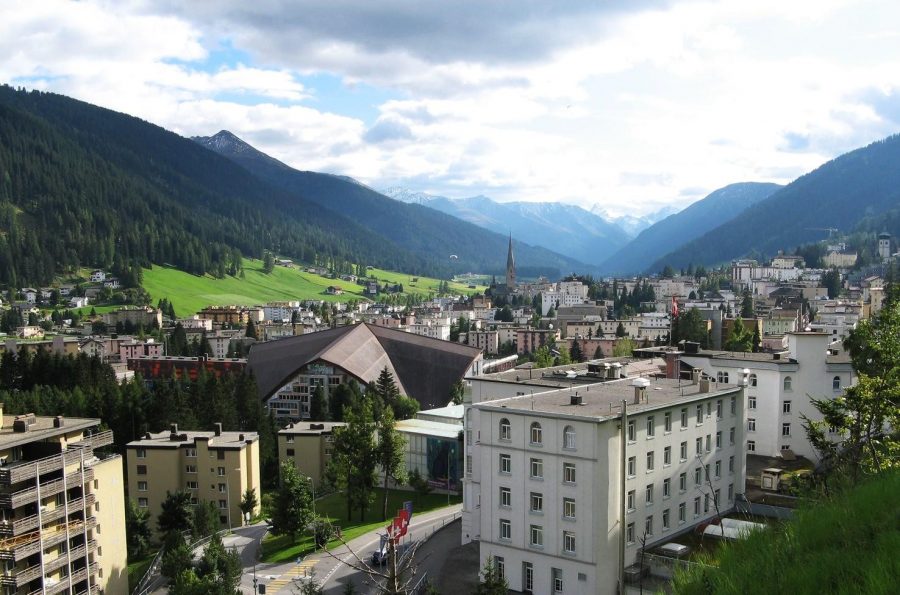Dawe: The Fight for the Environment Continues at Davos
Biovit [Public domain]
Following a year of wildfires, melting ice and rising sea levels, the main issue of the year was environmental problems at the World Economic Forum.
January 30, 2020
From Jan. 21 to 24, world leaders, CEOs, monarchs, businessmen, scientists and other high profile figures gathered in a small town in the Swiss Alps to participate in the World Economic Forum, Davos. There, they discussed pressing issues and how to solve them. Following a year of wildfires, melting ice and rising sea levels, the main issue of the year was environmental problems. However, since the topic of environmental safety is so politically charged, the forum was filled with controversy.
To start with, the British Prime Minister, Boris Johnson, forbade his cabinet from attending the forum, saying they should be focused on the people of the U.K. since apparently, along with leaving the European Union, the U.K. has decided to leave the rest of the planet as well. Boris Johnson clearly has a lot of contempt for the forum, as he called it “a great big constellation of egos involved in massive mutual orgies of adulation” in 2013.
Sustainability was another large topic of discussion. Microsoft announced its plan to go carbon negative by 2030, and by 2050, Microsoft will have eliminated all of its carbon emissions since the company was founded in 1975. Along with reducing their own footprint by launching a program, the Microsoft Sustainability Calculator, that will help businesses understand the carbon impact of their cloud usage by analyzing their estimated emissions. Microsoft is probably one of the few companies that I don’t have any environmental beef with as it was rated the number one environmentally company by Just Capital, a website that ranks companies. It has also given out 230 grants to help AI fight climate change, has a $15 per ton carbon fee for all the companies it works with and has made the largest solar agreement after purchasing 315 megawatts of energy.
The founder of the World Forum, Klaus Schwab, created a letter that asked companies to commit to zero greenhouse emissions by 2050. However, the conference has yet to disclose how many companies signed the letter.
Also attending the forum was the usual feuding duo, our favorite child and Greta Thunberg. Their usual, adorable banter about whether or not the world should be saved continued with Donald Trump calling climate activists “perennial prophets of doom.” Thunberg spent the week bashing global leaders for talking too much instead of taking action. Obviously, leaders can all the time they need, it’s not like the planet we live on is destroying itself or anything.
One good thing to come from Trump at Davos was him formally backing the Trillion Trees campaign which was launched at Davos. The program plans to plant, restore or conserve one trillion trees by 2050. This comes by surprise, considering Trump’s long-standing disbelief in climate change. His change of heart did not come from his voters, climate change activists, or the consistent evidence of climate change; instead, it came from Salesforce CEO Marc Benioff.
The trend of attacking the teenager who sacrificed her education to make sure that everyone could live on a planet that wasn’t on fire continued with Steve Mnuchin, the U.S. Treasury Secretary. He criticized Thunberg for not majoring in economics before speaking on fossil fuel investments. Thunberg fired back saying “it doesn’t take a college degree in economics to understand ongoing fossil fuel subsidies and our remaining carbon budget don’t add up.”
The summit has its own problems. It tends to be a gathering of the world’s elite since you have to be able to afford the travel costs if you are invited. You can also be a member of the World Economic Forum, which costs around $62,000. All continuing to separate poor people from the climate debate, even though they are the ones who are affected by it the most. The summit is also male-dominated, with only 22 percent of attendees being female. The summit has also been criticized as unproductive since most companies just take pledges. However, some gains have been made in the past. In 1988, meetings between the Prime Minister of Turkey, Turgut Özal, and the Prime Minister of Greece, Andreas Papandreou, helped the countries recover from war. Also, in 2000, programs were launched to immunize millions of children by the Global Alliance for Vaccines and Immunization. The hope is that this year, companies will take the forum seriously, as the need for sustainability is urgent.
I hesitate to put my faith in companies and corporations who have probably contributed to the problem and are only taking an interest now because of political pressure. They are dragging their feet, debating over small, insignificant details, while people are suffering. The rich and elite are only now caring about climate change because it is only now starting to affect them, while poor people have been suffering from the effects of climate change and pollution for years now.









